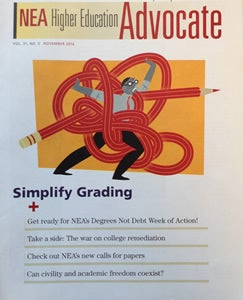Workshop summary: challenges, solutions, and workshop handout
Participants in this January 2015 workshop discussed challenges in their own grading practices and discussed ways of addressing those challenges. Among the challenges mentioned:
- learning to grade assignments differently depending on content and purpose (rather than grading all assignments the same way)
- too many papers and not enough time
- too many assignments and not enough time
- rubrics that don't allow faculty to award points for creativity
- students don't read the comments
- students don't correct their errors even if they do read the comments
- international students seem to have more challenges than other students but there is nowhere to send them for help with written assignments
- grades in one class section may not match those in a class section of the same course taught by another professor
Among the proposed solutions from participants:
- cut down the number of assignments you give
- spot check smaller assignments instead of reading every word
- work with colleagues in your discipline to share best practices
- replace opportunities for extra credit with Nilson's "tokens"
- require students to keep an editing log (and see also this set of directions)
The brief workshop handout (.pdf) summarizes the claims of Nilson and Shinske & Tanner, poses questions as a starting point for reflection about grades, and lists some resources.
Additional related reading and resources (updated 9/1/2017):
Fink, L. Dee. The Psychology of Feedback and Assessment. Tomorrow's Professor, Post 1373. Rpt. from "Designing Significant Learning Experiences I: Getting Started," ch. 3 in the book Creating Significant Learning Experiences, Revised and Updated: An Integrated Approach to Designing College Courses. San Francisco: Jossey-Bass, 2013.
Martin, Brian. Marking (Grading) Essays: Making It Easier and More Fun. Tomorrow's Professor, Post 1360. This short piece covers pacing, staying fresh, going faster, marking less, varied assignments, and other applications of his practical suggestions.
Nilson, Linda E. A Better Way to Grade. "Thriving in Academe." The NEA Higher Education Advocate 31.5 (Nov. 2014): 6-9.
Sadler, D.R., 2016. Three in-course assessment reforms to improve higher education learning outcomes. Assessment & Evaluation in Higher Education, 41 (7), 1081-1099. Review by Maryellen Weimer: A Challenge to Current Grading Practices. Faculty Focus 30 Aug. 2017.
Schinske, J. and Tanner, K., (2014). Teaching more by grading less (or differently). Cell Biology Education—Life Sciences Education, 13 (Summer), 159-166.
Smith, Victoria, and Stephanie Maher Palenque. Ten Tips for More Efficient and Effective Grading. Faculty Focus, 2 Feb 2014. Sensible suggestions to "help instructors grade more effectively while enhancing student learning."
Walvoord, Barbara E., and Virginia Johnson Anderson. Effective Grading: A Tool for Learning and Assessment. San Francisco: Jossey Bass, 1998. The Faculty Development library (in SH 422) owns several copies of this book. A second edition of this sensible and comprehensive book was published in 2009, and is now available in the AFYE library (in SH 422).
Weimer, Maryellen. Four Key Questions about Grading. Faculty Focus. 6 Aug 2014. Rpt. from Teaching Professor Blog. Don't miss the comments at the end of this summary overview; some of them are quite interesting.
-----. Is It Time to Rethink How We Grade Participation? Faculty Focus. 8 Oct 2014. Rpt. from Teaching Professor Blog. Don't miss the comments at the end of this summary overview; the last one is a response from Lolita Paff, the faculty member whose experimentation with grades for participation sparked Weimer's blog post in the first place.
Writing in Large GE Classes: Resources for Doing the Impossible. Academic First Year Experiences at CSU Northridge. Web. Resources collected by Cheryl Spector with Anne Kellenberger, Sharon Klein, and Whitney Scott. 2014.


